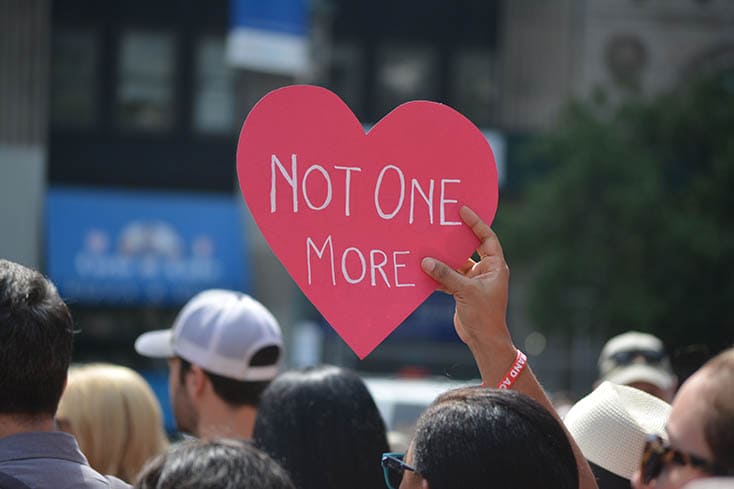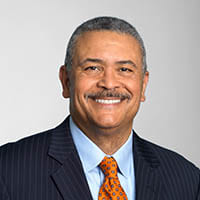June 14, 2022
By Daniel H. Gillison

I was attending a mental health conference in Louisiana when I learned about the shooting in Uvalde, Texas. I immediately rushed to my hotel room to turn on the TV and kept hoping somehow by changing the channels the story was not true… that it was just a bad dream.
Over the last couple of weeks as more unsettling details have continued to emerge, like many, I’ve continued to wrestle with feelings of denial, sadness, anger, fear. Truthfully, I’ve been at a loss for words.
As a parent, I can’t imagine having to endure the pain of losing my child in this way. I am heartbroken thinking about the horrors these students had to endure and the lifelong trauma they will have to navigate as a result. I am grieving deeply with all who have been impacted by this devastating tragedy — and for all who continue to be impacted by senseless acts of gun violence across the country.
There have been more than 200 mass shootings in the U.S. just this year, an average of one per day. That already horrific number is roughly equal to the number of mass shootings in the first five months of 2021, which itself was up 55% over the same time period the previous year.
There have been at least four mass shootings every single week of 2022. How many more lives must be lost, how many more families and communities must be traumatized, until we finally act as a nation to implement sensible solutions that put a stop to these avoidable acts of terror?
Let’s be clear: It is incorrect and harmful to link mental illness with gun violence.
Blaming mental illness for gun violence only serves to further stigmatize and discriminate against people with mental health conditions — who are more often the victims of violence than the cause of violence — and further distracts from the real issues at hand in addressing this national crisis.
Radicalism is not a mental illness. Terrorism is not a mental illness. Hate is not a mental illness.
There is no reliable psychiatric cure for angry, often young, men with access to guns who are committed to perpetrating violence (according to the Washington Post, 98% of mass shooters are men and almost half are between the ages of 18 and 29). The mental health system cannot prevent mass shootings because mental illness is not the problem.
We have to stop using mental illness as a scapegoat and instead focus on evidence-based risk factors for gun violence, like impulsivity and a history of violence.
Mental health conditions are common around the globe, yet no other country comes close to the level of gun violence our country experiences. According to the CDC, firearms have now surpassed car accidents as the No. 1 killer of children and adolescents. It defies not just statistics, but also common sense, to keep placing the blame for this uniquely American problem elsewhere.
We have to address the real issues at hand — such as the fact that it’s easier in our country to get a gun than to get mental health care, and the unfortunate reality that self-directed gun violence is fueling our nation’s suicide epidemic: The majority of firearm deaths each year are suicides, and firearms are the most common method used for suicide.
The time for meaningful change is long overdue. Lack of action by legislators is literally killing us.
In the aftermath of traumatic events like school shootings, the gaps in our current systems of mental health care are further amplified.
According to Texas State Sen. Roland Gutierrez, there is only one psychiatrist for all of Uvalde. A lack of providers in rural areas like Uvalde has always been a huge issue, but in the aftermath of tragedy, these disparities in access to mental health care become even more devastating as communities grapple with the lack of providers to address trauma.
Investing in our mental health resources as a nation is more important now than ever — not because doing so is the overriding solution to preventing gun violence, but because the trauma of gun violence is far-reaching.
On an individual level, we must commit to our own self-care and seek support as we try to cope with the vicarious trauma spurred on by the constant news coverage of these terrible tragedies. We must commit to checking in with the people around us, who may be struggling in ways far beyond what we could ever imagine. We must commit to hope where there are feelings of helplessness, love where there is hate, and action where there is apathy.
Gun Violence & Mental Health Resources:
 Daniel H. Gillison, Jr. is the chief executive officer of NAMI (National Alliance on Mental Illness). Prior to his work at NAMI, he served as executive director of the American Psychiatric Association Foundation (APAF) in addition to several other leadership roles at various large corporations such as Xerox, Nextel, and Sprint. He is passionate about making inclusive, culturally competent mental health resources available to all people, spending time with his family, and of course playing tennis. You can follow him on Twitter at @DanGillison.
Daniel H. Gillison, Jr. is the chief executive officer of NAMI (National Alliance on Mental Illness). Prior to his work at NAMI, he served as executive director of the American Psychiatric Association Foundation (APAF) in addition to several other leadership roles at various large corporations such as Xerox, Nextel, and Sprint. He is passionate about making inclusive, culturally competent mental health resources available to all people, spending time with his family, and of course playing tennis. You can follow him on Twitter at @DanGillison.We’re always accepting submissions to the NAMI Blog! We feature the latest research, stories of recovery, ways to end stigma and strategies for living well with mental illness. Most importantly: We feature your voices.
LEARN MORENAMI HelpLine is available M-F, 10 a.m. – 10 p.m. ET. Call 800-950-6264,
text “NAMI” to 62640, or email. In a crisis, call or text 988 (24/7).